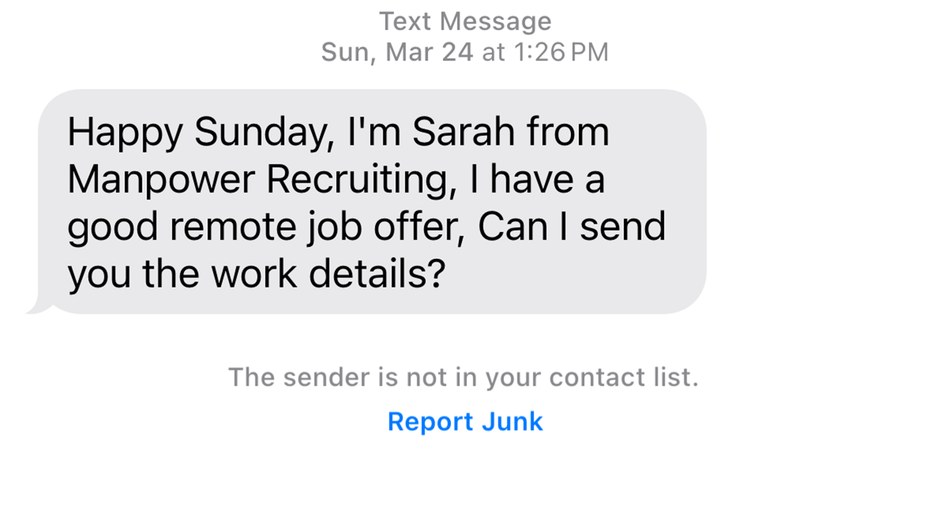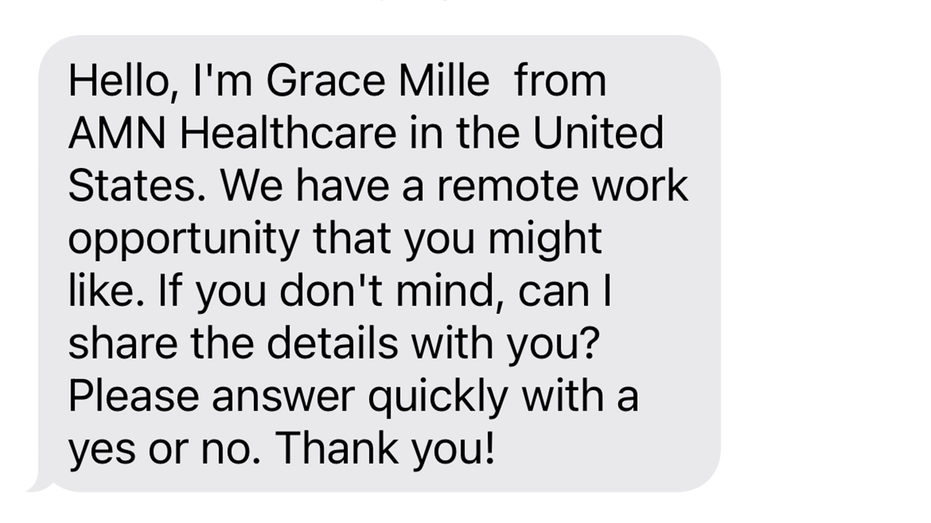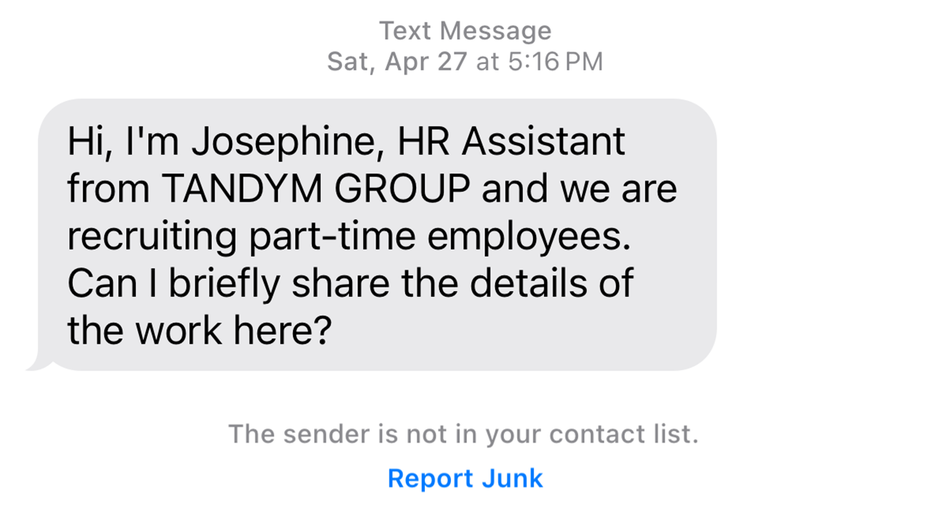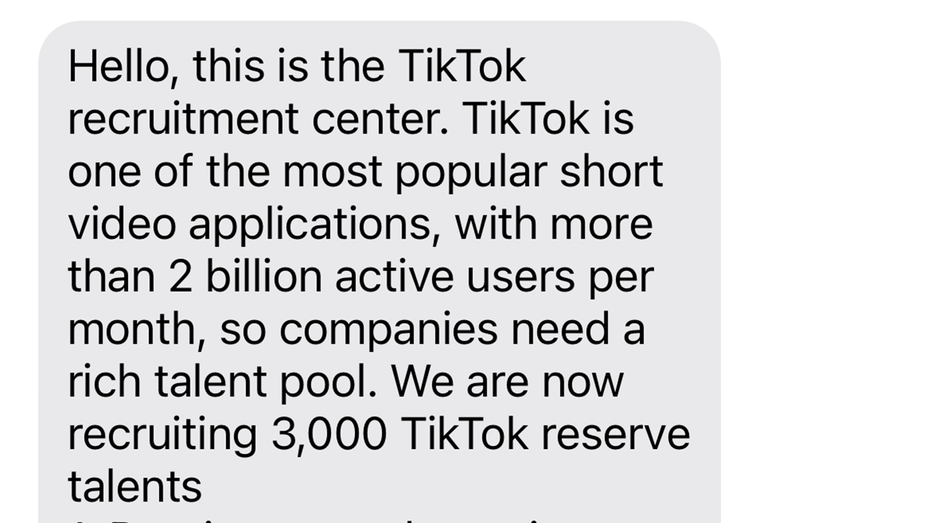[ad_1]
Ramsey Solutions personal finance expert Rachel Cruze breaks down how to avoid being tricked when filing your taxes and offers tips for getting the most bang for your buck.
If someone claiming to be a recruiter is texting you about a job offerdon’t immediately jump at the opportunity.
Bad actors are preying on victims in the midst of a highly competitive labor market through phishing or “smishing” attacks.
Phishing is a type of online scam that tries to get victims to give away personal information to bad actors. Smishing is a type of attack that uses fake text messages to trick people into downloading malware, sharing sensitive information or sending money to cybercriminals.
AI SCAMS ARE PROLIFERATING. A NEW TOOL IS ATTEMPTING TO COMBAT THEM
With these types of scams, a victim typically receives a text from someone posing as a recruiter, informing them about a part-time or remote work opportunity. The message often requests that the victim share more details about their qualifications. Even if the victim deletes or blocks these messages, they may continue to be bombarded with the same scam from various other numbers or email addresses. This type of fraudulent activity is prevalent on both text messaging platforms and WhatsApp.
It’s just one of several scams that are targeting people’s everyday habits. For instance, there has been a growing number of scammers falsely claiming to work for the U.S. Postal Service and sending victims an unsolicited text notifying them about a package delivery issue that needs immediate attention. Since early March, the FBI’s Internet Crime Complaint Center has also received thousands of reports across multiple states about a text message-based phishing attack impersonating highway toll authorities.
“It’s a zebra, just with different stripes,” former NYPD officer and security expert Bill Stanton told FOX Business.

A scammer claiming to be a recruiter and having a job opportunity available. (Fox News)
According to McAfee research, Americans receive an average of nearly 12 fake messages or scams through email, text or social media every day.
McAfee Chief Technology Officer Steve Grobman said these job scams “are particularly effective because they prey on victims who are in a potentially stressful situation and more open to engaging with unfamiliar contacts.”
“With the rise of gig worktemporary employment, and new digital communication methods, job seekers face an evolving landscape. Text messaging, a familiar and trusted way to confirm appointments and events, can falsely seem legitimate for job confirmations and onboarding,” he added.

A job phishing text claiming to have an opportunity, (Fox Business / Fox News)
SURGE IN FRAUD FOR THOSE 60 OR OLDER COSTS THEM BILLIONS, FBI SAYS
These scammers obtain phone numbers and email addresses from data breaches or even buy them from “shady data brokers,” according to Grobman.
Then, advanced cyberscammers will use AI to analyze data to “personalize messages, making them more convincing and likely to succeed,” Grobman said.

A scammer claiming to be an HR assistant and having a job opportunity available. (Fox Business / Fox News)
They may also use phone number and email spoofing, which would allow scammers to make it look like a legitimate number or one that comes from the same area code, according to Grobman.
He also warned that scammers may also try and lure victims through creating fake profiles on LinkedIn or sending emails with PDF attachments and QR codes purporting to be for real job openings.
SCAMMERS MOST COMMONLY IMPERSONATE THESE COMPANIES, FTC SAYS
It’s easy to replicate a company’s website and conduct fake interviews over Zoom, according to Grobman.
“Scammers play a numbers game – millions of fake messages might get blocked or deleted, but even a small percentage of successful hits can make the effort highly profitable,” he said.

A job phishing text claiming to have an opportunity, (Fox Business / Fox News)
Idea Grove CEO Scott Baradell told FOX Business that his company has actually been the victim of this type of job scam.
“Someone pretending to be a recruiter from my company has been contacting people by text and offering them high-paying jobs to “promote products” online,” Baradell said, adding that “once they sign up, they end up being scammed into paying the “recruiter” money.” Some people lost thousands of dollars.
GET FOX BUSINESS ON THE GO BY CLICKING HERE
Baradell said the company needed to get lawyers involved and had two fake websites taken down.
“It’s been a nightmare, and a costly one because of the attorney fees,” Baradell said.
How to spot a job scam:
Are they asking you to pay for a job?
Honest employees won’t ask you to pay to get a job, so anyone that does is scamming, according to the Federal Trade Commission.
What do you know about the company?
Always search the company name or the name of the person who is claiming to be a recruiter along with the words “scam,” “review” or “complaint.”
[ad_2]
Source link

